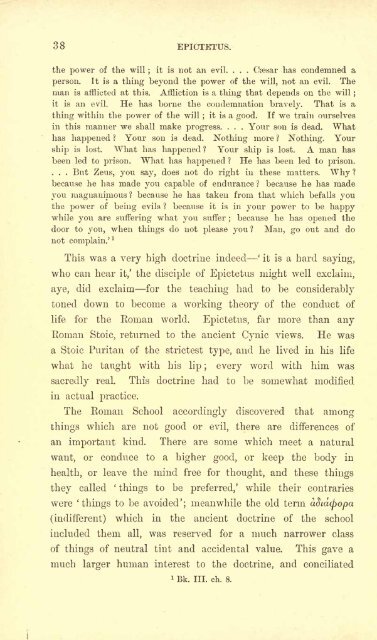Stoics and Saints - College of Stoic Philosophers
Stoics and Saints - College of Stoic Philosophers
Stoics and Saints - College of Stoic Philosophers
Create successful ePaper yourself
Turn your PDF publications into a flip-book with our unique Google optimized e-Paper software.
38 EPICTETUS.<br />
the power <strong>of</strong> the will it is not an evil. . . . Caesar has condemned a<br />
;<br />
person. It is a thing beyond the power <strong>of</strong> the will, not an evil. The<br />
man is afflicted at this. Affliction is a thing that depends on the will ;<br />
it is an evil. He has borne the condemnation bravely. That is a<br />
thing within the power <strong>of</strong> the will ;<br />
it is a good. If we train ourselves<br />
in this manner we shall make progress.<br />
. . . Your son is dead. What<br />
has happened ? Your son is dead. Nothing more ? Nothing. Your<br />
ship is lost. What has happened Your ? ship is lost. A man has<br />
been led to prison. What has happened? He has been led to prison.<br />
. . . But Zeus, you say, does not do right in these matters. Why?<br />
because he has made you capable <strong>of</strong> endurance ? because he has made<br />
you magnanimous ? because he has taken from that which befalls you<br />
the power <strong>of</strong> being evils ? because it is in your power to be happy<br />
while you are suffering what you suffer ;<br />
because he has opened the<br />
door to you, when things do not please you? Man, go out <strong>and</strong> do<br />
not complain.<br />
l<br />
This was a very high doctrine indeed it is a hard saying,<br />
who can hear it/ the disciple <strong>of</strong> Epictetus might well exclaim,<br />
aye, did exclaim for the teaching had to be considerably<br />
toned down to become a working theory<br />
<strong>of</strong> the conduct <strong>of</strong><br />
life for the Roman world. Epictetus, far more than any<br />
Roman <strong>Stoic</strong>, returned to the ancient Cynic views. He was<br />
a <strong>Stoic</strong> Puritan <strong>of</strong> the strictest type, <strong>and</strong> he lived in his life<br />
what he taught with his lip ; every<br />
sacredly<br />
word with him was<br />
real. This doctrine had to be somewhat modified<br />
in actual practice.<br />
The Roman School accordingly discovered that among<br />
things which are not good or evil, there are differences <strong>of</strong><br />
an important kind. There are some which meet a natural<br />
want, or conduce to a higher good, or keep the body in<br />
health, or leave the mind free for thought, <strong>and</strong> these things<br />
they called things to be preferred, while their contraries<br />
were things to be avoided ;<br />
meanwhile the old term<br />
a$ia&lt;popa<br />
(indifferent) which in the ancient doctrine <strong>of</strong> the school<br />
included them all, was reserved for a much narrower class<br />
<strong>of</strong> things <strong>of</strong> neutral tint <strong>and</strong> accidental value. This gave a<br />
much larger human interest to the doctrine, <strong>and</strong> conciliated<br />
1<br />
Bk. III. ch. 8.

















